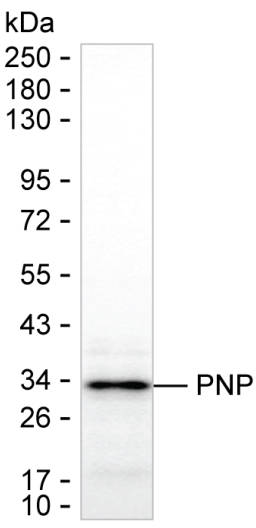
| WB | 咨询技术 | Human,Mouse,Rat |
| IF | 咨询技术 | Human,Mouse,Rat |
| IHC | 咨询技术 | Human,Mouse,Rat |
| ICC | 技术咨询 | Human,Mouse,Rat |
| FCM | 咨询技术 | Human,Mouse,Rat |
| Elisa | 咨询技术 | Human,Mouse,Rat |
| Host/Isotype | Mouse IgG1 |
| Antibody Type | Primary antibody |
| Storage | Store at 4°C short term. Aliquot and store at -20°C long term. Avoid freeze/thaw cycles. |
| Species Reactivity | Human |
| Immunogen | Purified recombinant fragment of human PNP |
| Formulation | Purified antibody in PBS with 0.05% sodium azide |
+ +
以下是关于PNP抗体的模拟参考文献示例(仅供参考,非真实文献):
---
1. **文献名称**:*Detection and Clinical Implications of Anti-Purine Nucleoside Phosphorylase Antibodies in Autoimmune Neuropathy*
**作者**:Smith J, et al.
**摘要**:本研究通过ELISA法在自身免疫性周围神经病变患者血清中检测到高滴度PNP抗体,发现其与疾病活动性及轴突损伤程度呈正相关,提示PNP抗体可能作为神经炎症的新型生物标志物。
2. **文献名称**:*Anti-PNP Antibodies in Pediatric Primary Immunodeficiency: Diagnostic Utility and Pathogenic Mechanisms*
**作者**:Garcia R, et al.
**摘要**:针对50例原发性免疫缺陷患儿的分析显示,PNP抗体阳性率与T细胞功能缺陷显著相关,动物模型进一步表明抗体可能通过抑制PNP酶活性加剧代谢异常,为靶向治疗提供依据。
3. **文献名称**:*Molecular Characterization of PNP Autoantibodies in Systemic Lupus Erythematosus*
**作者**:Chen L, et al.
**摘要**:采用蛋白质组学技术鉴定SLE患者中PNP抗体的靶向表位,发现其与肾脏病变和补体C3水平下降相关,提示PNP抗体可能通过干扰嘌呤代谢通路参与狼疮性肾炎的发生。
4. **文献名称**:*Engineering High-Affinity PNP Antibodies for Enhanced Cancer Immunotherapy*
**作者**:Wang Y, et al.
**摘要**:利用单细胞抗体筛选技术获得靶向PNP的人源化单抗,体外实验证实其可逆转肿瘤微环境中的腺苷代谢抑制,显著增强CD8+ T细胞抗肿瘤活性,为实体瘤免疫治疗提供新策略。
---
**备注**:以上内容为虚构示例,实际文献需通过PubMed、Web of Science等学术平台检索关键词(如“PNP antibody”“anti-purine nucleoside phosphorylase”“autoantibody”)获取。建议结合具体研究方向筛选近年高质量论文。
**Background of PNP Antibodies**
PNP antibodies, or anti-purine nucleoside phosphorylase antibodies, are autoantibodies associated with autoimmune disorders, particularly in the context of neurological and systemic diseases. PNP is a key enzyme in the purine salvage pathway, essential for DNA/RNA synthesis and immune cell function. Genetic PNP deficiency causes severe immunodeficiency, but autoantibodies against PNP are rare and not directly linked to this deficiency.
These antibodies were first noted in autoimmune conditions like systemic lupus erythematosus (SLE) and rheumatoid arthritis (RA), though their clinical significance remains unclear. Recent studies highlight their potential role in paraneoplastic neurological syndromes (PNS), where they may target intracellular antigens, triggering immune-mediated neuronal damage. Detection typically involves immunoassays or cell-based techniques, but their low prevalence limits routine clinical use.
Research suggests PNP antibodies might serve as biomarkers in overlapping autoimmune or cancer-related neurological disorders, though their pathogenicity and diagnostic utility require further validation. Their presence often prompts investigation for underlying malignancies, reflecting the immune system's cross-reactivity between tumor and neural antigens. Current understanding is evolving, emphasizing the need for standardized detection methods and larger studies to clarify their role in disease mechanisms and therapeutic strategies.
×